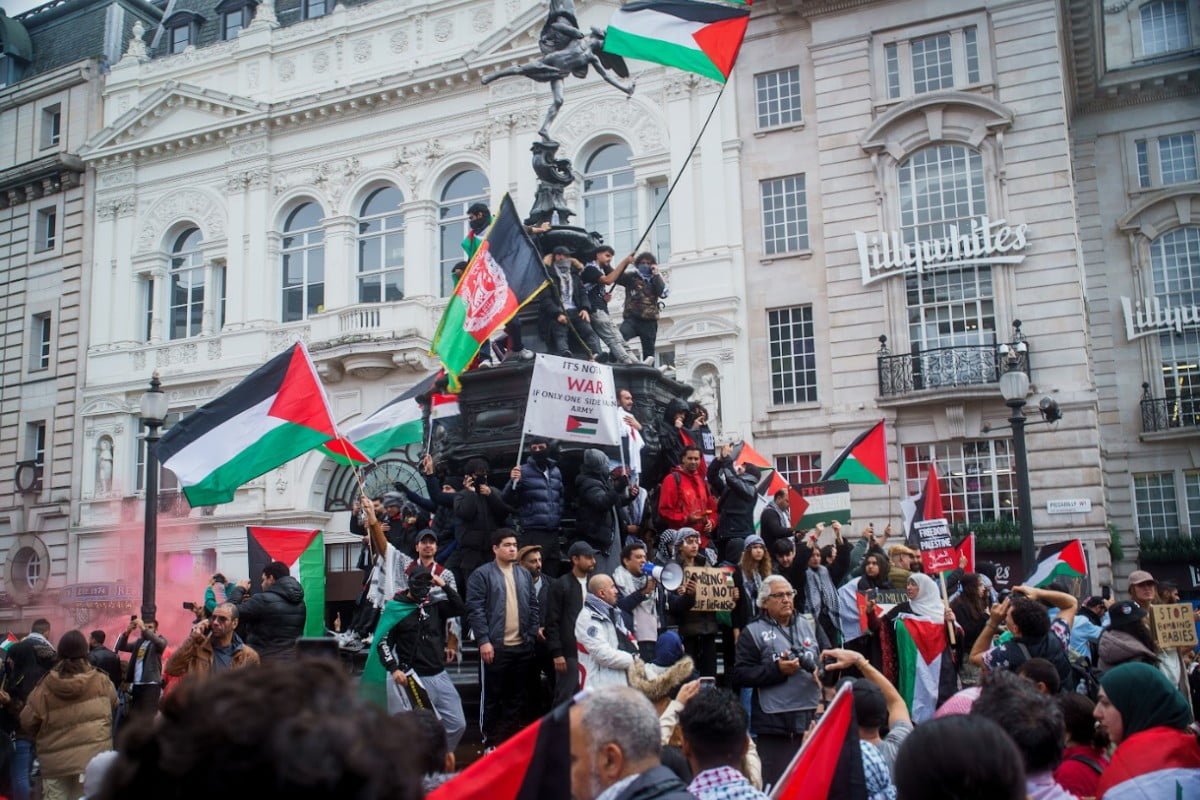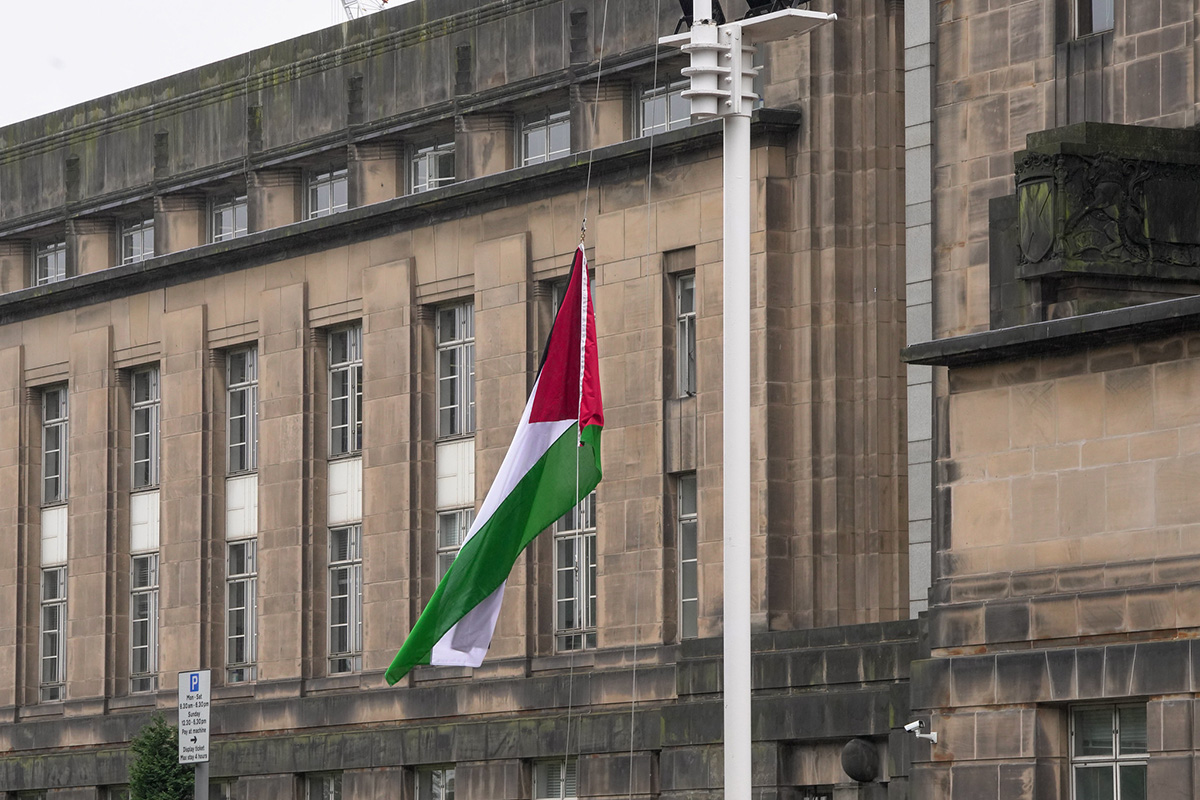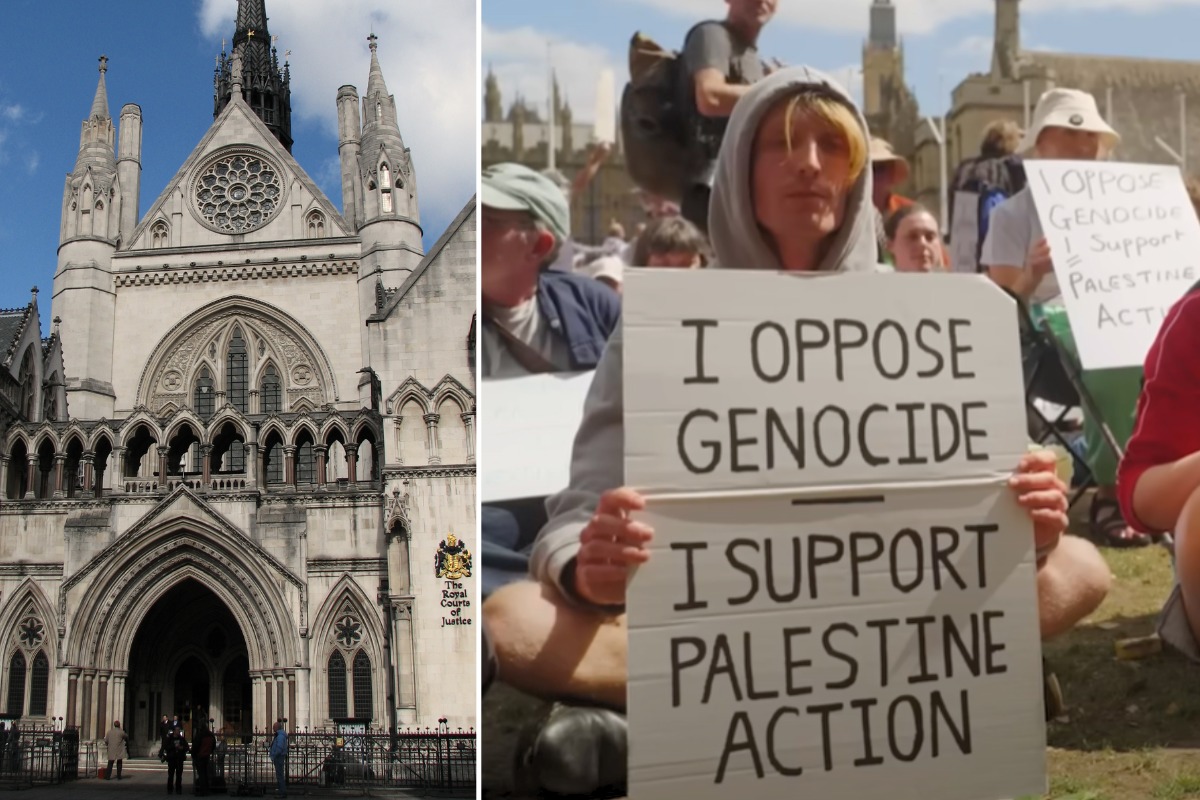A genocidal catastrophe is playing out in Gaza. Yet the warmongers in Downing Street and – decisively – Washington continue to back the murderous Israeli regime.
At the time of writing, the Palestinian death count in the Strip is approaching 20,000. Almost 50,000 more have been wounded by the Israeli bombing campaign. The IDF’s killing is indiscriminate.
Despite all this horror, at the UN Security Council last Friday, the US vetoed a call for an immediate ceasefire, while the UK abstained.
This pattern was then repeated on Tuesday this week, this time at the UN General Assembly. The US voted against a humanitarian ceasefire, and the UK again abstained. The resolution nevertheless passed overwhelmingly. But it is entirely non-binding.
This reveals what an impotent talking shop the so-called ‘United’ Nations is.
The same was seen in the UK Parliament a month ago. On the evening of 15 November, MPs voted overwhelmingly against a House of Commons motion calling for an urgent ceasefire.
Scandalously, but unsurprisingly, the majority of Labour MPs followed the party leadership’s orders and abstained on this question. This showed – if there was ever any doubt – on whose side Starmer and the right wing stand: with the oppressors, against the oppressed.
This all shows why moralistic appeals to capitalist politicians are a fruitless endeavour. When it comes down to it, for these ladies and gentlemen, maintaining their imperialist alliances in the Middle East trumps everything. The lives of innocent Palestinians count for nothing.
They may shed a few crocodile tears for dead civilians, and issue the occasional gentle reminder for Israel to ‘respect international law’. But such gestures do not represent any genuine sympathy for Gaza. These establishment leaders are simply concerned that too much unbridled carnage could provoke greater unrest at home, or spark a wider conflict in the region.
The only true allies of the Palestine people are the workers and youth of the world – those who have endured months of slander and (in some cases) repression from the ruling classes in order to show solidarity with their brothers and sisters internationally.
History repeats itself
The vote in the UK Parliament came just days after over a million people had marched through the streets of London demanding an end to Israel’s war on Gaza, and calling for justice and freedom for the Palestinian people.
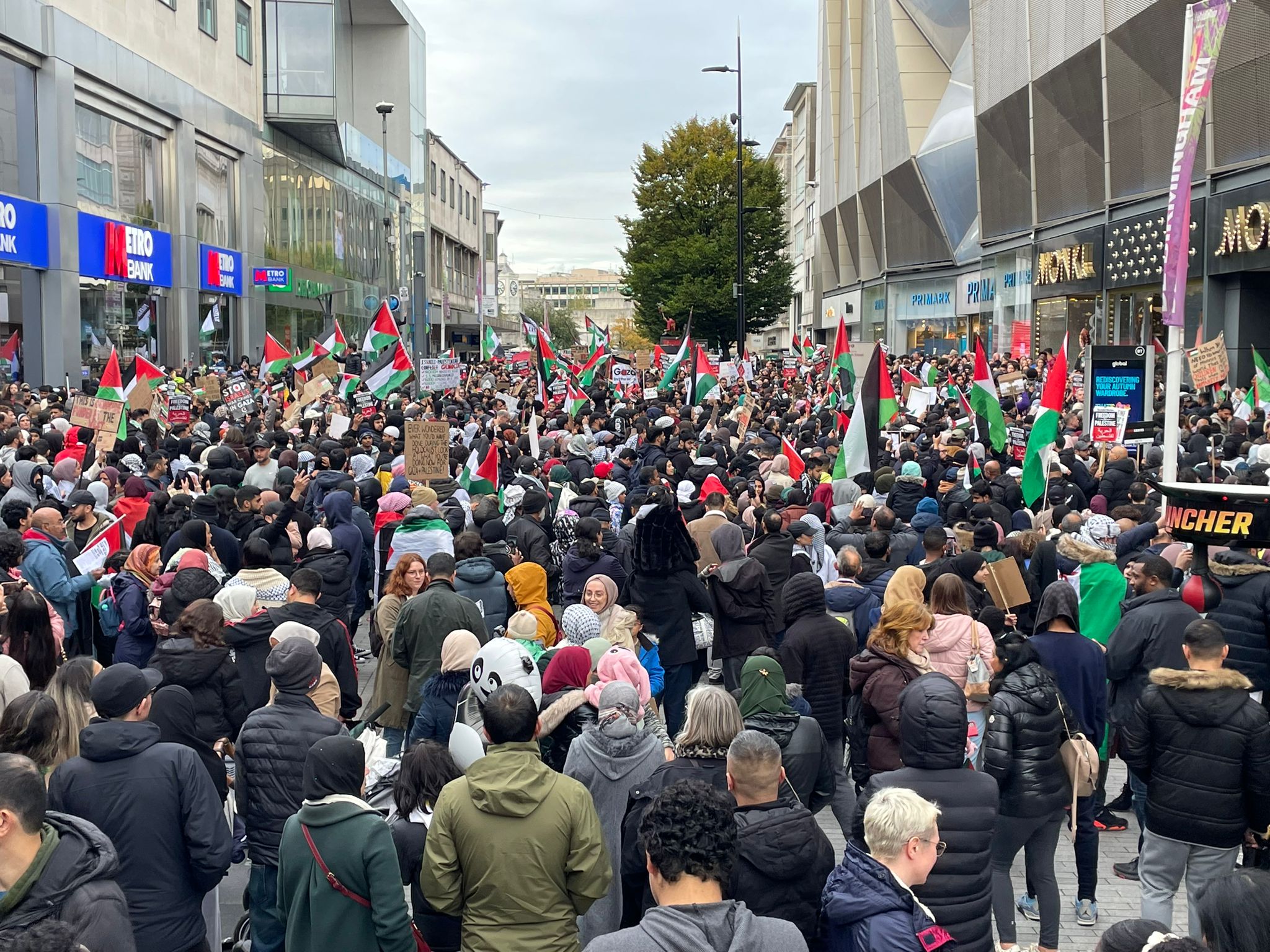
This mass mobilisation, so far, has proved to be the high water mark of the movement for Palestine in Britain. Since then, the demonstrations have dwindled.
The anger amongst ordinary workers and youth still burns intensely – as reflected in the student walkouts seen at schools and universities, or in the blockades of arms factories formed by militant activists in various locations in recent weeks.
But without any clear perspective or strategy from the top to channel and direct this energy, it has largely fizzled and dissipated, allowing despondency to seep in.
What is the point in turning up to one more demo, those wishing to show solidarity rightly question, if politicians are unmoved by them, and if there is no plan to escalate the movement beyond marches?
At recent demonstrations, a number of protestors have expressed their exasperation to Socialist Appeal comrades, stating their appetite for more than just marches. They are asking: what next?
For those old enough to remember, there are echoes of the Iraq anti-war movement in 2003. History seems to be repeating itself.
Back then, the movement in Britain was of comparable size to that seen in recent months, if not bigger. But even million-strong marches were not enough to deter Blair’s New Labour government from loyally following the Bush administration in its imperialist adventures.
Perspective and tactics
Many of the organisers of today’s protests were also at the forefront of the 2003 Iraq mobilisations. Groups like Stop the War led the demos then, and continue to lead them now.
Yet they have not learnt any of the lessons from the events of two decades ago, nor from the last 75 years of the Israeli-Palestine conflict.
Their outlook is entirely one of pacifism: denouncing the injustices of war and oppression, without any explanation of the systemic causes and class interests that lie behind this.
This moralistic opposition to war, in turn, is reflected in their strategy: one of ‘raising awareness’ and ‘applying pressure’.
Accordingly, their utopian demands for an imperialist peace – and in many cases, for a two-state solution – are aimed exclusively at capitalist politicians, with invocations for what the so-called ‘international community’ and its institutions ‘should’ do: implement UN resolutions; vote for ceasefires; apply sanctions; and so on.
But these imperialist powers back the slaughter. They are as culpable as the Israeli regime itself. Such appeals are therefore the equivalent of asking the arsonist to put out the inferno.
The methods employed by the likes of Stop the War, meanwhile, are limited to top-down calls for repeated A-to-B marches. The larger the demo, the more ‘awareness’ raised and the more ‘pressure’ applied. But in between, little is done to build up grassroots organisation and action to augment these big national demonstrations.
This highlights the importance of leadership and perspective. The tactics promoted by Stop the War (and other similar left reformists, including the ‘Communist’ Party) flow logically from their woolly, liberal attitudes and confused ideas.
What is needed is a mass campaign with roots in every community, workplace, and campus; with class struggle methods, such as strikes, walkouts, and workers’ action; and with a clear revolutionary programme – aimed at overthrowing ‘our own’ jingoistic ruling class, and ending war and imperialism by smashing capitalism.
Arms blockades
The labour movement is well positioned to offer a lead. Britain’s trade unions have millions of members, many of whom have been present on demonstrations for Palestine.
The UK is also a major exporter of arms and components for Israel’s military. Organised and mobilised, the trade union movement could easily ensure that not a single screw, circuit board, or shell leaves our shores, intended for use against Gaza.
Yet union leaders, thus far, have done little-to-nothing to bring this potential power of the organised working class to bear on the situation.
In the absence of a lead, either from the tops of the labour movement, or from the main national anti-war organisers and prominent Palestine solidarity groups, the most determined layers are taking matters into their own hands.
Semi-spontaneous walkouts of school students have been seen in a number of towns and cities, for example. Efforts should be made by local activists to link up with these, giving them both organisational and political support – such as spaces to meet and discuss, and suggested demands and slogans around which to mobilise their peers.
Some activists, clearly wishing to go beyond mere marches, have turned towards direct action. For instance, more radical groups – such as the Palestinian Youth Movement – have been amongst those looking to create maximum ‘disruption’ by occupying key railway stations in London, Manchester, Glasgow, and other major cities.
Outside various UK arms facilities, meanwhile, there have been a string of direct action protests in recent weeks, aimed at blocking the manufacture and transportation of weapons destined for the Middle East.
Groups like ‘Workers for a Free Palestine’ have led the charge on this front, organising large-scale ‘pickets’ outside these arms factories, with bodies and banners blocking lorries from going in or out.
📍 Bournemouth
📍 Lancashire
📍 Brighton
📍 GlasgowToday trade unionists have shut down 4 sites in Britain which produce components for the F-35 fighter jet currently being used in Israel’s bombardment of Gaza. #StopArmingIsrael pic.twitter.com/PUVp5jzuFW
— Workers for a Free Palestine (@Workers4Pal) December 7, 2023
Such protests are certainly impressive and militant. Nevertheless, whilst many involved in these actions are workers and trade unionists, and have described their blockades as ‘pickets’, this is not the same as the workers from within these industries organising and striking to shut down arms production and distribution themselves.
There is a key difference between these blockades and a genuine workers’ strike or occupation. In the latter case, organised workers gain a taste of the collective power that they have over production. In the former, industrial workers are reduced to sympathetic passive spectators.
The impact of such workers’ action has been proved in practice. In the 1970s, for example, mechanics at the Rolls-Royce factory in East Kilbride refused to work on jet engines belonging to the Chilean junta. The Scottish workers downed tools, and Pinochet’s military aircraft remained grounded.
Blame for the lack of proper workers’ mobilisation today lies with the leaders of the trade unions, who have failed to put out any call to mobilise and organise workers within the arms sector.
Instead of calling for nationalisation and workers’ control of arms factories, with a modern-day Lucas Plan to transition production to socially-useful technologies and equipment, the union leaders have vehemently opposed any course of action that might ‘threaten jobs’.
Socialist Appeal comrades attending these actions have reported that efforts are being made to connect with workers on the inside. This is a step in the right direction. Only the organised working class – acting as a class, through mass methods of struggle – has the power to halt the imperialists’ war machine.
‘Global strike’
Similar things could be said of other forms of protest seen in recent weeks; most notably, the so-called ‘global strike’ that was trending on social media on Monday this week (11 December).
Posts on Instagram and Twitter called for an international ‘day of action’ to #StrikeForGaza. These included suggestions for people to participate by: skipping work or school, and staying at home; not buying anything, either online or in shops; and only using social media accounts in order to promote the Palestinian cause.
How to participate in the global strike for Gaza on Monday 11th of Dec 2023?
1. Don’t buy anything (cash or online)
2. Don’t use your bank account, and don’t make any transaction
3. Don’t leave your house
4. Deactivate your Facebook and Instagram accounts
5. Tweet using the… pic.twitter.com/oOxTDTbd4O— PALESTINE ONLINE 🇵🇸 (@OnlinePalEng) December 9, 2023
“If the politicians do not hear us, then we can strike from economic life and daily movement, and we can boycott everything,” stated Palestinian filmmaker and influencer Bisan Owda, in one viral post. “We can put pressure on them to stop supporting and blessing the massacre that is happening in Gaza.”
Reports indicate that this call for action was heeded by many in the Arab world. Shops, schools, and government offices were shut down in the West Bank and East Jerusalem. Usually-busy neighbourhoods and markets in Lebanese cities were quiet. And thousands of protestors took to the streets across Jordan.
In the West, however, this ‘global strike’ largely passed by unnoticed. At best, it helped to ‘raise awareness’ on social media. At worst, it was an active encouragement for people to pursue impotent individual actions, sowing illusions in the idea of consumer boycotts or the effectiveness of one-man ‘strikes’ by isolated workers and students.
Far from ‘putting pressure’ on the ‘international community’, such tactics only help to atomise us, stripping workers of their main strength: their power to bring society – and the bosses’ profits – to a standstill by taking collective action.
That activists are striving to take action based on ‘pickets’ and ‘strikes’ indicates that the appetite exists for more than repeated marches. And it shows that, with the reawakening of the working class in Britain over the last couple of years, there is an understanding amongst a large layer that militant methods of class struggle are needed.
But in the absence of such a fighting strategy from the workers’ leaders, attempts to substitute the movement of the working class with the efforts of a core of dedicated activists can lower consciousness, not raise it.
Instead, communists propose demands and tactics that bring out the key class questions; that give workers confidence in their ability to unite and fight to transform society; that raise the need for the organised working class to overthrow the warmongers, and run the world in their own interests; and that therefore point the way forward in terms of ending war once and for all. And we fight in the workers’ movement for these demands and methods.
Palestinian voices
Advocates of the 11 December ‘global strike’ have defended it on the grounds that this call came from groups inside Palestine. And indeed, coalitions such as the Palestinian National and Islamic Forces – which includes political factions related to the PLO, and other related organisations – and grassroots groups in Gaza did publicly back this demand for a worldwide day of action.
Similarly, on a number of UK campuses, Socialist Appeal comrades have been told by local activists from Palestine solidarity organisations that they are not allowed to promote the slogan ‘intifada until victory’, on the grounds that “Palestinians we’re in touch with don’t want it”.
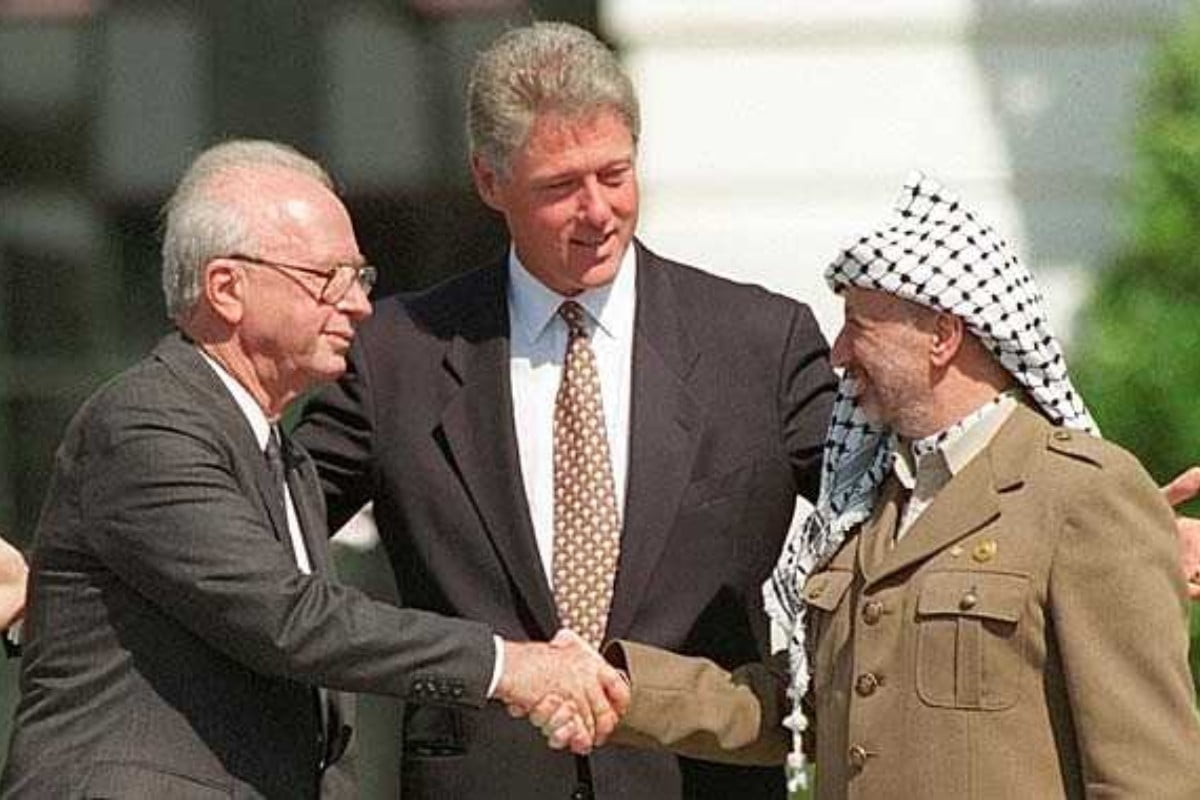
In certain cases, we have even received reports of our comrades being physically prevented from chanting these words – not by the police or university authorities, who have also sought to silence us, but by these ‘official representatives’ of the Palestine solidarity movement.
In essence, such arguments are a form of identity politics. “We must listen to the Palestinians,” we are told. “Only those from Palestine are allowed a voice.”
This is the same logic as the establishment’s weaponised accusations of antisemitism against the left, but turned inside out. Only those of a particular identity are allowed a say. Everyone else must ‘stay in their lane’.
Yes, the voice of Palestinians must be heard and amplified, in order to drown out the deafening, hypocritical, imperialist cacophony emanating from the capitalist press and politicians.
But which voices should we be listening to? Are we to assume that everyone in Palestine thinks the same? Or that all these ‘representatives’ reflect the genuine interests of the Palestinian people?
It should be clear to any thinking activist that many of these so-called ‘representatives’ of the Palestinians are anything but.
After all, would we follow the same line in regards to the leaders of the British labour movement? Nobody believes that Starmer, the leader of the ‘Labour’ Party, acts according to the needs of ordinary workers. Nor would any consistent class fighter uncritically defend the decisions and actions of the trade union leaders.
In fact, throughout history, the ‘official’ leaderships of the Palestinian people have been completely rotten: from Arafat and the other PLO leaders, with their sellout of the Oslo Accords; to the utterly corrupt and despised Palestinian Authority today.
Vague appeals to ‘Palestinian civil society’, meanwhile, are not much better.
The reasoning behind assertions that ‘we can only listen to Palestine voices’ is extremely pernicious. More often than not, it is an apology for opportunism; an excuse for adapting to the liberal prejudices and reformist pressures that weigh down on the movement, and for buckling in the face of smears around ‘extremism’ and ‘antisemitism’.
In the worst cases, this argument is used as an outright justification for imperialism. The 2011 NATO intervention in Libya, for example, was scandalously defended by some on the left on the grounds that ‘people in Benghazi’ were calling for it. Over a decade later, with the country lying in ruins, these same ‘lefts’ have conveniently forgotten about their previous naivety.
We, the communists of the IMT, have provided Palestinians with a platform. But whether it be West Bank residents speaking about the daily violence they face at the hands of Zionist settlers and Israeli soldiers; or Palestinian trade unionists calling on their international counterparts to take action against the arms industry: we have chosen to spotlight those who embody and express the lives and struggles of the working class.
Role of communists
The role of communists is not to parrot the propaganda of the ruling class, either word for word, or in a diluted form. We must not bend to their attempts at intimidation by moderating our slogans or methods.
Nor must we merely provide an echo chamber for those who claim to ‘represent’ the working class or speak on behalf of the Palestinian people, but who in fact offer no real solution or serious strategy for ending the chaos and destruction of capitalism and imperialism.
Instead, communists must seek to say what is; to tell the truth; and to struggle alongside workers and youth, highlighting the next step that is required in order to advance.
This means separating what is progressive from what is reactionary within any movement or programme. It means demanding what is objectively necessary, not simply what seems ‘pragmatic’ or convenient. And it means understanding and explaining the root cause of war: the capitalist system, and its insatiable appetite for profit.
Above all, it means building a revolutionary leadership – a Revolutionary Communist Party – rooted in the working class, that can show the way forward: pointing out the path towards genuine freedom for Palestine, and for the whole of humanity.

